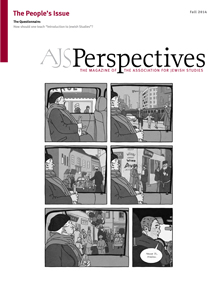Dear Colleagues,
"The Jewish people" is a rousing term evoking a timeless collective with common purpose. It appears often in declarations about history and politics, commanding authority with the definite article and coherent subject. But who are these people? Who identifies with them and under what criteria? Who speaks for the Jewish people? The historical answer, and perhaps the contemporary one, is that self-appointed elites speak on behalf of particular Jewish communities and sometimes in the name of transhistorical and geographically diffuse Jewish people. Beyond the official register what have the people themselves had to say? What acts have they engaged in that constituted the Jewish people? What might the Jewish people be up to now?
Maybe the idea of a Jewish people—or any people, for that matter—is illusory, with each instance of conjuring the unified collective motivated by the need to clarify who is in and who outside the group. The biblical people of Israel may have emerged from the various local groups who joined a military alliance or agreed with a program of state centralization. The Jewish people of the rabbinic era may have gained recognition through the normative practices defined by the rabbis. In medieval and early modern times, the Jewish people may have traveled on shared circuits or marked the cycle of the year in similar ways. The Jewish people of modernity may have gained definition through the exclusions and inclusions afforded them by different states. The notion of a unified people may have seemed most palpable with the founding of a Jewish state and may now be beleaguered by disputes about the policies of the state.
Yet there is no denying that individuals have seen themselves and their practices as part of a longstanding Jewish people. An affective, emotional component fosters a sense of belonging and self-understanding. Each individual utterance concerning the people contributes a layer of meaning to the term and brings the speaker into a wider dialogue. For all that scholars might say about the construction of ethnicity and religion, something particularly powerful and compelling occurs during identification with a people. This issue considers the events that created the Jewish people and the experience of belonging. It captures moments of ordinary and extraordinary actions that have constituted the people. The articles focus on a nonelite, grassroots perspective on Jewish texts and history. Rather than telling a top-down story of events and Jewish cultural production, "The People's Issue" portrays a bottom-up version, ranging across popular culture, folklore, the local, the public sphere, and the masses. In some cases, this may involve a counterreading of hegemonic texts; in others, a shift of focus from the usual narrators and subjects. In an eclectic manner, "The People's Issue" presents a kind of people's history of Jews and Judaism.
Matti Bunzl
University of Illinois at Urbana-Champaign
Rachel Havrelock
University of Illinois at Chicago

